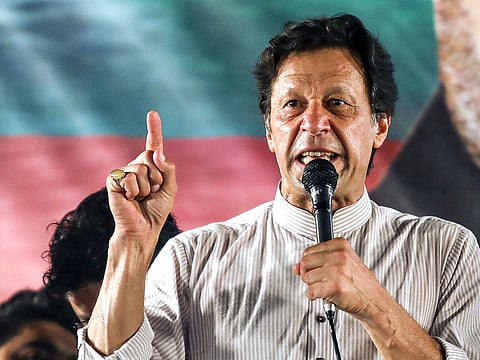Imran Khan needs a reality check
More than the hype and showmanship, the Pakistan PM ought to focus on governance

Thursday’s resignation of Pakistan’s Minister of Science, Azam Swati, has triggered compelling questions over the country’s direction, notwithstanding the end to a running controversy surrounding yet another political figure.
Swati shot to prominence when five members of an impoverished family in Islamabad including two women were arrested for allegedly ‘trespassing’ on his personal property. Though those slum-dwellers were later released after the matter shot to prominence in the Pakistani media, the case became further controversial amid reports of the transfer of Islamabad’s police chief.
Swati’s departure came just a week after Prime Minister Imran Khan proudly celebrated his first 100 days in office, showcasing his government’s achievements early on in its tenure. The event organised to publicise the 100-day achievements to a packed audience ranging from diplomats and other notables to Imran’s party loyalists, was simply an unnecessary sideshow. Rather than showcasing the proverbial beginning of change across different sectors, Imran and the government of his Pakistan Tehreek-i-Insaf (PTI) party needs to focus on one clear target — the business of running the government.
For too long, Pakistanis have suffered at the hands of successive governments run by self-serving individuals with little interest or appetite for public service. It may still be early to cast a final verdict on Imran’s performance, but his government has clearly begun looking more like the same as Pakistan has suffered before. The Swati episode smacked of Pakistan’s past — a country governed by leaders armed with an obsession to consider institutions such as the police as no more than employees of the state of Pakistan to serve its rulers rather than the people. In his early days, Imran has assembled a variety of targets for his regime. They range from overseeing the plantation of ten billion trees in otherwise heavily deforested Pakistan to building five million homes for the homeless to taming one of the world’s highest population growths and the list goes on forever. These objectives are indeed commendable.
Yet, a key question that remains unanswered is: Should the prime minister of Pakistan take on such a large menu for reforming the country? An equally compelling question then must follow: Should the prime minister of a country like Pakistan risk losing sight of the most vital challenges facing the country?
While Imran’s heart seems to be in the right place, he badly needs to take himself through a fast reality check. The challenges surrounding Pakistan today are profoundly important in three areas — rescuing the country from a continuing economic downturn; tackling key elements of internal security; and last but not the least, ensuring religious harmony.
Beyond these three objectives, Imran and his government needs to focus on rebuilding institutions that once thrived and delivered high-class performance. Over the years, institutions in a variety of areas have fallen in neglect and become dysfunctional. Though their revival is essential, it must not be the prime minister to necessarily push for reforms at the micro level and run the risk of losing sight of the big picture.
That essentially is the key fault on the 100-day performance chart that is being presented by the government so proudly. And speaking of the big picture, the trio of issues — fixing the economy, tackling internal insecurity and ensuring religious harmony — must be a quite handful to keep Imran working more than just over time.
Pakistan under Imran faces an unprecedented economic challenge that has forced the new government to begin negotiating with the International Monetary Fund for a bailout programme to avert a full-blown crisis on its foreign payments. That is the outcome of years of mismanagement, notably under the last government of former prime minister Nawaz Sharif, when imports skyrocketed without a corresponding rise in exports. The former government also undertook mindless expenditures in the name of development, without a corresponding reference to exactly how such initiatives would benefit Pakistan’s long-neglected grass roots.
And while Pakistan’s economy clearly needs to be fixed, the urgency of tackling matters tied to internal security cannot be ignored. Swati’s case has once again highlighted the extent to which the police remains far from being a force for the public’s protection. Imran’s promise of improving Pakistan’s security environment is ultimately in serious danger of remaining half-baked, unless backed by long overdue sweeping reforms. These must range from reforming the public’s access to ordinary police stations to the oversight mechanisms employed for running the police force.
And finally, the cause of ensuring religious harmony is deeply essential in a country where conflict continues in the name of religion. Last month’s riots that disrupted life across Pakistan for three days, after the Supreme Court exonerated Asia Bibi, a Christian woman arrested eight years ago on a blasphemy charge, have raised compelling questions once again over the country’s internal unity. In choosing to launch street protests, the demonstrators ignored the vital fact that the verdict that won Asia freedom did not reverse the blasphemy law in Pakistan. Instead, the verdict only found fault with the way the law was applied in this case. For Imran and his government, it is now vital to launch a fresh discourse that will help narrow the divide in the name of religion — all in favour of a renewed commitment to national unity.
In pursuing these core objectives, it will be best for Imran to erect safeguards against spreading himself too thin. The obvious agenda for fixing Pakistan is narrow and straight.
Farhan Bokhari is a Pakistan-based commentator who writes on political and economic matters.



